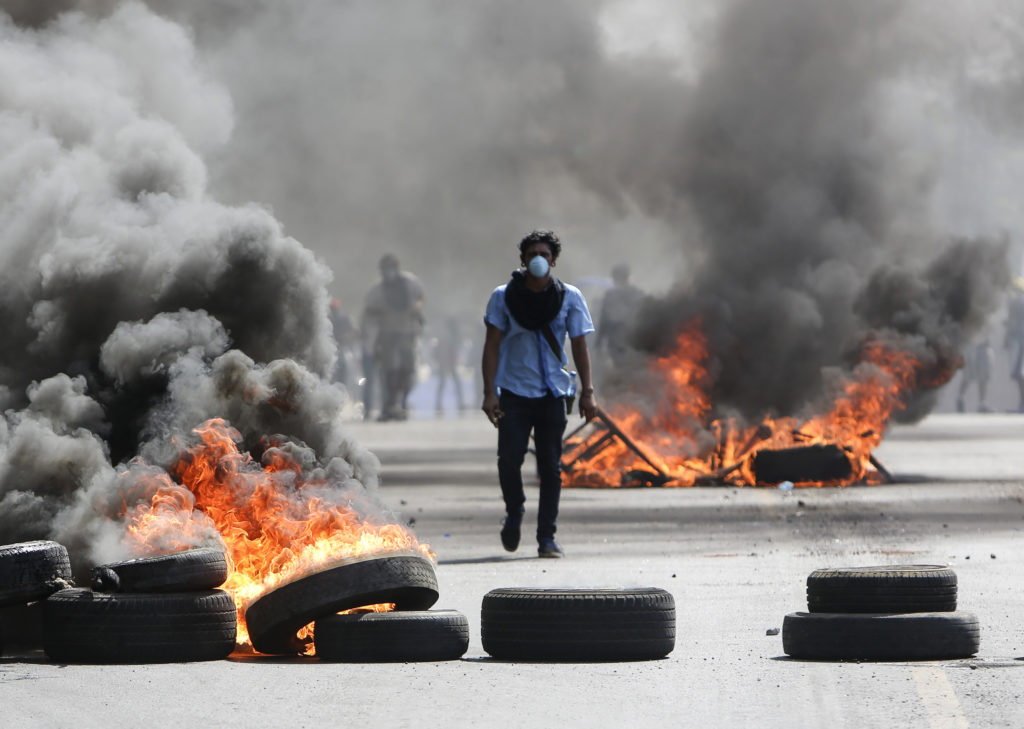(AP Photo/Alfredo Zuniga)
(AP Photo/Alfredo Zuniga)
The demonstrations that erupted in Managua, Nicaragua in late April, after President Daniel Ortega’s government announced cuts in retirees’ pensions and a related tax increase, came as a surprise to both the Nicaraguan government and to outside observers. Activist groups, including environmentalists and women’s organizations, joined retirees in protests, followed by students at major public and private universities, as well as residents of some of Managua’s poorest neighborhoods. The demonstrations soon went beyond the original call to halt the changes in the pension and tax system: they tapped into much deeper frustration at more than a decade of Daniel Ortega’s rule and his increasingly autocratic approach to governing.
The Nicaraguan government was taken aback by the size and scale of the protests and by the challenge to the president’s authority. The country had previously seen protests over election fraud charges, as well as demonstrations over environmental issues, but they had not been so big or so militant. The government had responded to these past protests with excessive force: pro-government youth groups had attacked demonstrators while police looked the other way. When the April 18, 2018 protests began, the government—apparently believing that a show of force would once again quell the demonstrators—unleashed anti-riot police squads and pro-government youth groups. But on this occasion, demonstrators, especially the students, resisted fiercely.

A masked protester walks between burning barricades in Managua, Nicaragua, Friday, April 20, 2018 (AP Photo/Alfredo Zuniga).
Rather than succeeding in suppressing the demonstrations, this time government repression seems to have generated even more resistance. Across the country, spontaneous demonstrations took place, and they continue today. Masaya, a town about an hour from Managua that was the scene of a historic battle where local residents joined Sandinista guerrillas in defeating the forces of the Somoza dictatorship, has declared itself a “liberated territory.” Barricades constructed by demonstrators surround the city, and the Catholic bishops entered the town to discourage attacks by government forces. Polls show that Daniel Ortega, who won re-election to a third term in 2016 with more than 70 percent of the vote, is deeply unpopular. A recent CID/Gallup poll shows that more than 70 percent of respondents believe he should resign; his approval rating is at 19 percent.
Despite the overwhelming opposition, Ortega seems to be intent on intimidating demonstrators with violence in order to outlast them.
This past weekend, at least 14 more people were killed, and there is evidence that attacks on demonstrators are being carried out by snipers. On Sunday, July 8, the Papal Nuncio and Monsignor Baez, were beaten as a pro-government crowd attacked demonstrators at a basilica in Diriamba. A national dialogue mediated by the Church has been convened, but so far the government seems more interested in stretching out the process than in seriously attempting to resolve the crisis.
Ortega’s government could rein in most of the violence if it chose to do so. It could order police and other security forces to exercise restraint and use minimal force; it could order police to prevent attacks on demonstrators by pro-government groups. It could conduct serious investigations into the abuses committed by security forces to date (more than 250 people have been killed in demonstrations since April 18, including at least one journalist, shot by a sniper while broadcasting on Facebook.)
However, the government has failed to take any of these steps. Only after domestic and international pressure did it invite the OAS Inter-American Commission on Human Rights to visit the country. The OAS preliminary report, released in May, is a damning indictment, and calls on the government to take 15 separate steps to control violence. The commission has just appointed a group of four international experts to investigate the human rights abuses that have taken place in the country.
More broadly, Ortega’s government has to recognize that it has to engage in serious dialogue with the growing and diverse opposition if it wants to address the unrest in the country.
Demonstrators have demanded that President Ortega and his vice president (and spouse) Rosario Murillo resign, and he has ruled out the possibility of early elections. Among protestors, there is strong consensus that Ortega must go, and that the debate is really about what should follow after he leaves. Meanwhile, as the Church continues to push for a national dialogue, there is little evidence that the president is engaged in a serious effort to reach a solution.
While Daniel Ortega and his party the Sandinista National Liberation Front (Frente Sandinista de Liberación Nacional, FSLN) have historically been identified as critics of free market economics, the Ortega government and the Nicaraguan business community made their peace with each other over the last decade. However, the demonstrations over the social security issue, and then more broadly over democracy in Nicaragua, have forced many in the business community to choose whether to continue to support the Ortega government. Ortega has now lost the formal support of one of Nicaragua’s most powerful business organizations, which has joined with protesters to form a Civic Alliance for Justice and Democracy, the coalition group involved in Church-mediated national dialogue.
The opposition to Ortega consists of a variety of forces, with a variety of visions for the future of the country. They include some—though not all—in the business community, who would like to see a prompt return to stability; activists from the traditional opposition political parties who would like to compete more freely in an electoral process, ex-Sandinistas who would like a return to what they consider the core values of the FSLN; and students and community activists with more radical demands. The opposition encompasses those on the right, in the center, and on the left. What has united them is the recognition that the Ortega era has come to an end, and that Daniel must go. They will need to work out what they want for the future of Nicaragua.